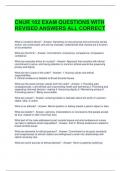CNUR 102 EXAM QUESTIONS WITH
REVISED ANSWERS ALL CORRECT
What is narrative ethics? - Answer- Sensitivity to how personal and community stories
evolve, are constructed, and can be changed. Understands that choices are a function
of circumstance
What are the 5C's? - Answer- Commitment, conscience, competence, compassion,
confidence
What are everyday ethics for nurses? - Answer- Approach their practice with ethical
commitment to serve, and having attention to common ethical events like preserving
privacy and dignity
What are the 2 parts of the code? - Answer- 1. Nursing values and ethical
responsibilities
2. Ethical endeavours Related to Broad Societal Issues
What are the seven primary values from the code? - Answer- 1.Providing safe,
compassionate, c and ethical care 2.promoting health and well-being 3. Promoting and
respecting informed decision -making 4. Honouring dignity 5. Maintaining privacy 6.
Promoting justice 7. Being accountable
What are values? - Answer- enduring beliefs or attitudes about the worth of a person,
object, idea, or action
What is an attitude? - Answer- Mental position or feeling toward a person object or idea
What are beliefs? - Answer- opinions, interpretations or conclusions that people accept
as true ( based on faith more than fact)
What part of the code addresses broad, societal issues and what endeavours nurses
can take to address social inequalities? - Answer- Part 2- Ethical endeavours related to
broad societal issues
What are elements for ethical practice? - Answer- Commitment to do good, sensitivity
and receptiveness to ethical matters and willingness to enter into relationships with
clients receiving care
What are some sources of ethical distress? - Answer- Harm to patients (suffering)
, Health policy constraints
Inadequate resources
Inadequate staffing
Effects of cost containment
What are the original principles of bioethics - Answer- Autonomy, nonmalificence,
beneficence, justice, fidelity, veracity
What is nonmaleficence? - Answer- duty to do no harm
What is beneficence? - Answer- to do good, act in the best interest of the patient
What is fidelity? - Answer- Keeping ones promises/commitments. Being accountable
What is veracity? - Answer- Telling the truth and expecting it of others (trustfulness;
integrity, determination)
What are the 9 headings for new grad competencies? - Answer- Clinician, professional,
communicator, collaborator, coordinator, leader, advocate, educator, and scholar
Leninger's Theory - Answer- Transcultural or culture of caring theory
What is professionalism? - Answer- the conduct, aims, or qualities that characterize or
mark a profession or a professional person. Conducting oneself with integrity and
excellence
What are the overarching principals of ELCs? - Answer- 1. Beginning practitioner, keep
reasonable expectations
2. Works within scope, seeks guidance
3.has the requisite skills for ELCS
4. Is prepared as a generalist , informed based practice across all ages and groups
5.has strong theory, humanities, research and sciences
6.practices within legislation, ethics and competencies
7.applies critical thinking
Dorothy Orem - Answer- Self care deficit model. restoring the clients self care capability
to enable him or her to sustain structural reliability, performance, and growth through
purposeful nursing.
Martha Rogers - Answer- Emphasis on the science and art of nursing, with the unitary
human being central to the discipline of nursing
Margaret Newman - Answer- Theory of health as expanding consciousness describes
nursing intervention as nonintervention, where the nurse's presence helps patients
recognize their own pattern of interacting with the environment and to find deeper
meaning in their lives




